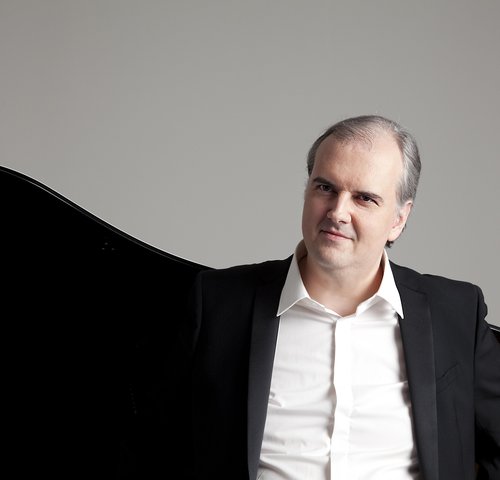Angelich in Schumann and angelic Liszt from Noseda, NSO

Nicholas Angelich performed Schumann’s Piano Concerto with the National Symphony Orchestra Thursday night. Photo: Marc Ribes
The National Symphony Orchestra’s sound is changing under Gianandrea Noseda.
At their latest outing together, Thursday night in the Kennedy Center Concert Hall, the Italian conductor led his musicians through an extravaganza of soul-baring romantic music. It was an opportunity to show a range of technicolor timbres, from chamber-sized sounds to crushing fortes, and the orchestra delivered with astonishing unity of purpose.
Nicholas Angelich made an understated NSO debut in Robert Schumann’s Piano Concerto in A Minor. The American pianist put a delicate mark on the first movement, interpreting the tempo marking, Andante affettuoso, not as principally about speed and force. Applying rubato generously, Angelich drew out the tender side of the solo part, but with a steely touch in the crashing chords and leaping octaves.
Angelich is also an excellent chamber musician, and it was the spirit of collaboration with the orchestra that stood out in this performance. Unlike some flashier soloists, when it was his turn to accompany solos in the orchestra part, he accompanied them rather than just crashing ahead. This approach gave the dreamier sections of the first movement and the yearning second movement room to breathe, as the piece seemed more a conversation of many voices than merely a showpiece.
On the other hand, the finale was on the conservative side in tempo. Angelich played with exceptional clarity and distinction of individual voices in the solo part, and the orchestra responded with verve and spirit. In the end, though, the piece could have used a little more daredevil fire, to go along with the delicate and polished parts.
Fire was certainly not lacking in Noseda’s account of the original version of Liszt’s A Faust Symphony, without the choral conclusion Liszt added later. The NSO last played the piece in 1942, under founding music director, Hans Kindler. Orchestral neglect of this confounding, occasionally brilliant work is hardly limited to Washington, but Noseda has already made a case for Liszt’s orchestral tone poems in a comprehensive recording with the BBC Philharmonic.
The conductor drew out both the melancholy gloom and the heroic sweep of the substantial first movement. The heraldic brass writing, the daring harmonies, and the unusual paired timbres, like horn and viola in dialogue, all shimmered. Noseda’s insistent gestures and furious beat added a restless edge, preventing the occasional longueurs from dragging on too long.
In the second movement, devoted to the angelic character of Gretchen, Noseda presided over extraordinary playing from his lead musicians. Liszt features the woodwinds in extended solos, and Noseda elicited stellar playing from flutist Aaron Goldman and oboist Jamie Roberts. As solos from the principal strings were mixed in, it often seemed like a concert by the Kennedy Center Chamber Players had been inserted into the middle of a symphony concert.
In the devilish finale, devoted to the character of Mephistopheles, the NSO turned on a dime with the pacing of Noseda, through thickets of tangled chromaticism and a fugue on a contorted, syncopated subject. Based on this blistering account of Faust, one can only hope for more Liszt in the future with Noseda.
Cutting out the opening work, the Tragic Overture of Brahms, would have resulted in a neat and clean two-hour program. But that would have meant missing out on Noseda’s incisive, well-drilled rendition of a piece that can often seem dour and bland but here did not. The NSO musicians responded to it with intensity and crisply focused ensemble, and Noseda’s careful attention to balances kept the strings from covering the more delicate woodwind solos. This conductor can make even a skeptic a believer.
The program will be repeated 8 p.m. Saturday. kennedy-center.org; 202-467-4600







